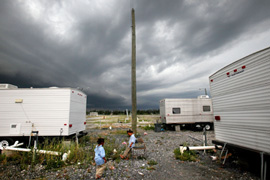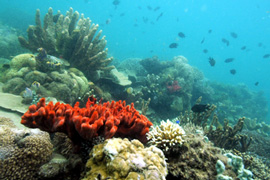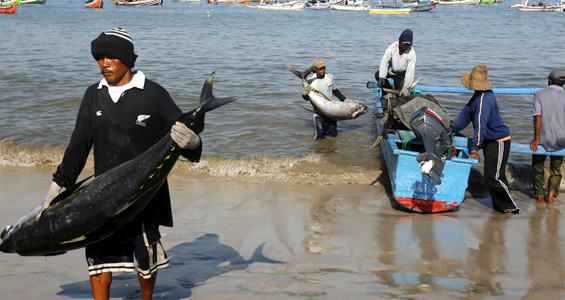Development goals all at sea
Why climate change and warming seas affect developing and developed nations alike.

| ||
As ministers from 121 countries converge on Manado, Indonesia this week for the World Oceans Conference, oceanographer Simon Boxall explains why climate change and warming seas bode ill for us all.
Keep reading
list of 4 itemsTurtles swimming to extinction in Malaysia as male hatchlings feel heat
Could shipping containers be the answer to Ghana’s housing crisis?
Thousands protest against over-tourism in Spain’s Canary Islands
For those of us who live near the coast, the oceans have a clear and direct impact on our everyday lives; storms, varying sea levels, fishing and recreation.
However, if we live inland, what possible influence can the oceans have on us?
For those of us who live in the developed world climate change is our problem, our fault, and we have to act now to prevent the situation from worsening.
A sceptic would argue that climate change is not the problem of the developing world.
If only life on our planet was that simple.
The oceans cover more than 70 per cent of the Earth’s surface and not only determine our climate wherever we live, they are also a source of food (they could fulfil the world’s protein needs if managed properly), a major means of transport (95 per cent by weight of all goods are transported by sea), and they provide 60 per cent of the oxygen we breathe.
 |
| Hurricane Katrina showed developed countries’ vulnerability to climate change [GALLO/GETTY] |
In an ironic twist, the oceans also contain the majority of the oil and gas reserves that create carbon dioxide, one of the key greenhouse gases, and are the major sinks of the very same gas – through absorption by the microscopic plants of the sea as well as the water itself.
Our planet’s climate is warming up – an estimated 4°C by 2100, and there is no doubt now that humans burning fossil fuels like coal, gas, oil significantly contributes to this.
These are facts confirmed by the Intergovernmental Panel on Climate Change (IPCC), a group of 4,000 expert scientists from over 130 countries. The IPCC has no political allegiances, nothing to gain by good or bad news, just well researched science.
Barometer of change
The ocean is the barometer of climate change, particularly in the polar sea regions.
The sea absorbs most of the heat that enters the earth’s system and acts like a huge storage system.
As the planet warms up we see the changes in the oceans first, and they are warming. The temperature of the world’s oceans has risen by 0.25°C in the past 30 years.
T
| In Depth |
|
|
hat does not sound much, but in total energy terms it is huge.
We are already seeing rapid loss of sea ice – September of both 2007 and 2008 witnessed the lowest ice cover in the Arctic Sea in human history, with many areas seeing little or no ice reforming during the 2008/9 winter.
Does this mean that sea levels will start rising rapidly?
Well, they will rise by about one metre during this century – it does not matter where you live, the rise will be everywhere – but this is not because of ice melt.
Firstly, seas rise because land ice or glaciers melt and add water to the ocean basins, and, secondly, liquids – or the seas – expand when you heat them up.
The Arctic ice cap is already floating and so, contrary to popular belief, will not add to sea level as it melts. Think about ice in a glass of water.
Coastal defence
Rising sea levels will flood many coastal areas.
|
Rising sea levels will flood many coastal areas. Developed countries … can mitigate this. [But] one only has to look at the impact of Hurricane Katrina to realise it is not always that simple |
Developed countries can, in theory, mitigate this; they have money, technology and organisations with responsibility for coastal defence in place.
I say “in theory” as one only has to look at the impact of Hurricane Katrina in New Orleans to realise it is not always that simple.
What about the developing world? In some regions the coastal areas can be defended, in many they cannot, and in numerous developing nations the populations are focused around the coastal areas.
Katrina also highlighted a second issue related to warming seas; storms, hurricanes – or typhoons – and monsoons all get their energy from the oceans.
As the oceans get warmer, they provide more energy to these systems, and warmer seas evaporate more quickly, leading to more rainfall.
There have been a number of studies which show an increase in hurricane intensity and frequency over recent years, and the IPCC 2007 report predicts more intense monsoon events are likely.
The effects of rising sea levels, increased storms and periods of extreme rainfall all lead to coastal flooding and damage, with many of the rich and fertile deltas of Asia and Africa being severely affected.
In addition, the interceding dry seasons will be longer and hotter. So the future will be heavy floods for part of the year and drought the rest of the year. This is not just a prediction – it is already happening on an increasingly regular basis.
Changes in climate will also bring about changes in life in the ocean.
Species sensitive to temperature are already migrating north or south in search of cooler waters.
Rising sea levels are squeezing many of the intertidal habitats like mangroves – a natural defence against storms – out of existence, to say nothing of small, low island habitats.
It is not just humans who will be looking to relocate from the Maldives over the forthcoming years. However, human migration from flooded lands is likely to increase in many regions of the world.
The increase in temperature is also increasing the acidity of the ocean, albeit by a small amount, but enough to bleach and damage coral habitats.
Dire outlook
The outlook is not good, particularly for a developing world which is just finding its feet.
 |
| Climate change is causing damage to corals and forcing marine species to migrate [AFP] |
In 2006 Nicholas Stern, a globally respected economist, published a key report which offered two paths; we either spend about two per cent of the global GDP now to halt, or at least slow, climate change or we spend 20 per cent in the future to mitigate it.
The developed world, primarily the US and Europe, have been the problem thus far and need to reduce carbon emissions rapidly.
To be fair to both, development in the 20th century took place in ignorance of the damage being done. Europe, Japan and others are on board with change and so now, under a new administration, is the US.
The forthcoming UN climate conference in Copenhagen in December will be critical, but not just because of changes in the US – which currently accounts for about 30 per cent of the carbon – but because of the developing world.
China has the largest population today, and by 2060 India will overtake it. Between them, they will account for over half of the world’s population. Both countries are also developing – rapidly.
Exports are soaring and the local populations are demanding the trappings of a so-called developed nation – cars, television and air conditioning – all power hungry items.
If that power comes from fossil fuels, then what today’s developed countries do will make little difference.
We need to work globally: supporting each other in using the best of technology and the most innovative ways of producing that power.
It is not fair to demand that the developing world alone has to implement a new, safer approach to its power generation.
However, it has the most to gain if it adopts alternative carbon neutral energy, and the most to lose if it does not.
In the long term, there are two paths.
The golden path is for cheaper, inexhaustible energy which is generated locally with no reliance on external supplies of fuel.
A further benefit of this route will be the eventual export of a maturing energy and appliance efficient technology.
The muddied path is literally that. Extreme weather, floods and changes in habitat.
Dr Simon Boxall is a professor in oceanography at the National Oceanography Centre affiliated to Southampton University in the UK.
The views expressed by the author do not necessarily reflect those of Al Jazeera.


